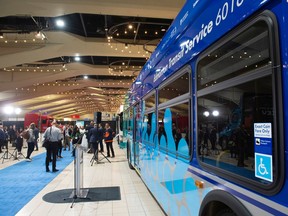
Article content
The City of Edmonton has canceled plans to build a hydrogen fuelling station on the south side that would have been used for city buses and private vehicles, at least for now.
Announced with enthusiasm last April, the city last Wednesday closed the public request for proposals (RFP) for a facility inside the Edmonton Transit Service’s (ETS) bus garage, to be run by a private company. It was initially promoted as a way to strengthen the economy and drive investment, demand and innovation in the local hydrogen sector.
Advertisement 2
Article content
Article content
Arjan Sharma, branch manager for Edmonton’s fleet and facility services, said the bid was “paused” because the demand expected for hydrogen in the short term has changed.
“Given the evolving nature of these emerging technologies, we have taken a cautious and incremental approach to the adoption of hydrogen propulsion technologies into the city’s fleet,” he said in an email.
“The city intends to return to market for a permanent hydrogen fuelling solution when there is greater clarity and consistent demand for high volumes of hydrogen fuel by the City of Edmonton.”
Sharma said guaranteeing a minimum demand for such fuel is “difficult within the current environment,” but the city is reviewing the effectiveness of the technology and is still committed to transitioning to a “low-carbon future.”
City council considered buying 40 new hydrogen fuel cell buses in the most recent capital budget but voted to buy 20 diesel buses instead.
Two different hydrogen-related pilot projects by the municipality are still going ahead. ETS is testing a hydrogen-fuelled bus and running four city vehicles on both diesel and hydrogen. Sharma said the initial results for the hydrogen-powered bus are “promising.”
Article content
Advertisement 3
Article content
At the time it was announced, the city said the facility would help create demand for hydrogen.
Edmonton Global spokesperson Sherri Bouslama, for the city’s arm’s-length group that lobbies for investment in the Edmonton area, said their understanding is the bid is not “cancelled” but rather “paused.”
“We’re still getting a lot of international interest in the hydrogen sector in our region, and we look forward to continuing to support upcoming projects and announcements within this sector,” she said in an email.
Air Products is building a separate mobile fuelling station at the Edmonton International Airport, scheduled to open in 2025.
Sohi ‘committed’ to hydrogen, but urges caution on new technology
Mayor Amarjeet Sohi, who has been vocally supportive of the hydrogen projects in Edmonton, said the city is still committed to and excited about opportunities in this sector. He said the city’s new bus barn would be able to accommodate electric and hydrogen-fuelled buses in the future.
But, he said, he wants the city to proceed with caution given the failure of the electric buses.
Advertisement 4
Article content
“These are new technologies, and we need to be responsible in a way that whatever we end up doing, we do not repeat the mistakes of the electric vehicle purchases that we saw the previous council made the decision on,” he said.
“Any new technology we embrace — I’m excited about hydrogen, but we also need to proceed with caution.”
More than half of Edmonton’s 60 electric buses are grounded, and the vehicles are regularly out of service because they do not work as promised. The city is seeking more than $82 million in damages from manufacturer Proterra Inc.
Whether council ends up buying hydrogen buses depends on how the testing goes, Sohi said. The existing bus storage facilities can only accommodate diesel buses, Sohi said.
The now-closed bid was announced as the Canadian Hydrogen Convention was taking place at the Edmonton Convention Centre. The city was to work with advocacy group Alberta Motor Transportation Association (AMTA) and the non-profit Transition Accelerator to review proposals.
The AMTA said at the time the station would show investors that Alberta recognizes the importance of the motor transportation industry’s impact on the environment and commitment to building a sustainable and responsible supply chain.
Article content



